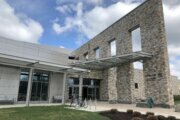WASHINGTON – Imagine instructing your mobile device: “Send me a cellphone notification if there’s a single girl who likes reggae nearby.”
The just-launched SocialRadar, – based in D.C. – cross-references location beacons with information posted online to quickly identify people nearby and describe how you know them.
“You could walk into a room, go to a restaurant, conference or event, look down at your phone and instantly know there are 10 people here that you know,” says Michael Chasen, founder and CEO.
As of today, SocialRadar is available free of charge in the App Store for iOS devices, and will have Android and Google Glass versions in coming weeks. The app is free.
Chasen says SocialRadar taps into profiles and location data from major social-media networks – Facebook, Twitter, Foursquare, Instagram, Google+, LinkedIn – and shows connections in a list or map view.
The app divides the people it finds into Everyone, Friends, Friends of Friends, or Favorites.
In addition, the app specifies whether you know a person professionally or socially, and shows whether acquaintances are in nearby businesses or other locations.
Using a slider, the Radar Range feature enables a user to tailor how wide a social net to cast, ranging from a 25-foot radius to the entire world.
In a networking situation, if the app determines that Chasen knows someone, “I can click on the radar and this will let me walk right to her, if I wanted to find her in a crowded room.”
On Day One of its launch, the circle of SocialRadar users is small, but the app doesn’t only look for others using SocialRadar; it lets you know when anyone you are connected to on other social networks is nearby.
Demonstrating the features, Chasen pulls up someone named Rick.
“He checked in on Foursquare, so he doesn’t actually realize he’s appearing on SocialRadar, but because we’re friends on Foursquare his information has been uploaded and also diplayed on SocialRadar,” says Chasen.
Profile information entered in Facebook and LinkedIn is automatically compiled in a user’s SocialRadar profile.
Items that have been Liked on Facebook show up in a SocialRadar profile, under Interests.
Mutual SocialRadar users can chat within the app, or with the chat functions particular to the other social networks through which they are connected.
Privacy under the SocialRadar
Chasen, a co-founder and former CEO of Blackboard, says that with so many powerful location features, “you have to have and give people a high degree of control over their own privacy.”
On the SocialRadar user’s profile page, privacy settings can be easily changed from Public to Friends Only.
When set to Anonymous, connected users can communicate without initially disclosing their identities.
“You’d know someone here went to Georgetown University, but you wouldn’t know who. You could send me a message, ‘You went to Georgetown, I went to Georgetown as well, who are you?’ and I could see if I want to tell you or not,” Chasen says.
When a person wants privacy, the Invisible setting lets them “be off the grid,” says Chasen.
Eventually Chasen envisions users being able to tailor privacy settings, along the lines of Close Friends in Facebook.
In addition to real-time awareness of people around you, SocialRadar users can set up Alerts.
“I’ll get an e-mail whenever a co-worker is within two blocks, or (it can) send me a text message whenever a fraternity brother comes to town, or send me a cellphone notification if there’s a single girl who likes reggae nearby,” says Chasen.
Right in front of your eyes
In the near future, Chasen says Google Glass users will be able to determine who is nearby just by walking into a room.
“It’s actually a perfect form factor for this type of technology,” says Chasen.
The wearable computer is currently only available to a limited audience, with limited usefulness, and at a high price of $1,500.
“It’s a very primitive technology at this point, with a limited feature set. You don’t have the full scope of capabilities of SocialRadar; it’s more of a limited subset,” says Chasen.
Still, Chasen believes location-based apps are a natural for wearables.
“It really does show the potential of that type of technology long-term, and what it can do, and we think SocialRadar is a perfect app for it,” says Chasen.
See the SocialRadar experience:







